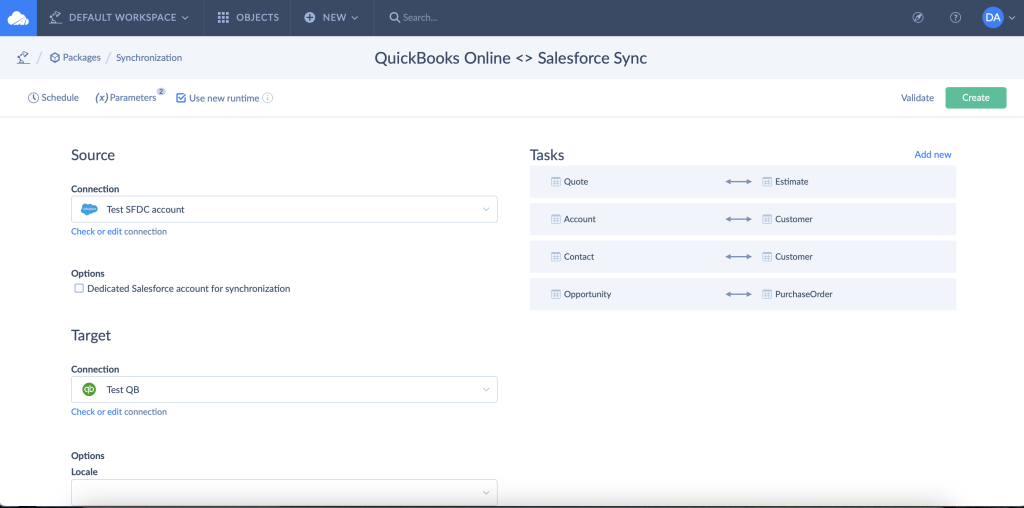This is a guest post by Rithom Consulting LLC.
QuickBooks is a widely used accounting software that is designed to help small and medium-sized businesses manage their financial transactions effectively. With its user-friendly interface and a variety of features, QuickBooks has become a go-to choice for businesses looking to streamline their accounting processes. However, as businesses grow and expand, they often find that they need more than just a basic accounting tool.
This is where QuickBooks integration comes into play. Integrating QuickBooks with other applications and software can help businesses:
- automate various tasks,
- reduce manual errors,
- improve efficiency.
In this partner blog post, we’ll focus on the benefits of QuickBooks integration and how businesses can take advantage of it to optimize their financial management processes.
Client Task
The Rithom client’s sales and account management teams had a lack of visibility into payments and invoices and had to depend heavily on the accounting team for information. They wanted to find a way to improve visibility for their team, eliminate the need for additional licensing costs and improve their overall customer experience.
Client Challenge
The sales and account management teams are licensed for Salesforce but not Quickbooks.
The sales team is unable to move projects forward until their customer pays their invoice. Not having access to QuickBooks, the sales team had to make multiple phone calls and spend their valuable time searching for information. If the accounting team wasn’t available, the sales team had to wait to get the information they needed.
When an account manager was speaking to a customer, he had no visibility into accounting data and could not answer the customer’s questions while on the call. With no access to QuickBooks, the account manager had to make multiple phone calls and spend their valuable time searching for information. If the accounting team wasn’t available, the account manager had to wait to get the information they needed.
The client was faced with having to purchase multiple licenses from Quickbooks for team members to have visibility into customer accounting data.
Our Solution
In order to sync data bi-directionally between QuickBooks and Salesforce, a powerful tool like Skyvia can be utilized. Skyvia is a cloud-based data integration solution that enables easy and efficient data syncing between various business applications.

To get started with Skyvia, you need to sign up for an account and connect your QuickBooks, and Salesforce accounts to it. Once you’ve done that, you can create a data synchronization task within Skyvia, specifying which data entities you want to sync and how often you want the sync to occur. In our case, we choose the following fields:
- Salesforce Opportunity –> QuickBooks Sales Order
- Salesforce Quotes –> QuickBooks Estimates
- Salesforce Invoice –> QuickBooks Invoice
- Salesforce Transactions–> QuickBooks Transactions
- Salesforce Account –> QuickBooks Customer
- Salesforce Contact –> QuickBooks Contact
Skyvia also provides error logging for quick resolution of failed syncs and a mapping tool that allows you to customize the data mapping between QuickBooks and Salesforce. This means that you can ensure that the data is synced accurately and in the format that you require. You can also set up data filtering and transformation rules so that only relevant data is synced between the two systems.
In addition to bi-directional data syncing, Skyvia also offers other features such as data backup, data replication, and Data Flow and Control Flow for advanced use cases. This makes it a comprehensive solution for managing your business data across different applications.
Conclusion
QuickBooks integration can provide significant benefits for businesses looking to optimize their financial management processes. Skyvia, in particular, offers a powerful integration platform that enables businesses to move their data where it’s most needed. Whether it’s connecting QuickBooks with e-commerce platforms, CRMs, or other accounting tools, Skyvia’s robust integration capabilities make it easy for businesses to automate their processes and get the most out of their QuickBooks data.
- Improved visibility. Team members can avoid working in silos now that all their relevant customer data is in the customer’s Salesforce record. Team members save time on non-value-added tasks like searching for information versus having all of the data at their fingertips inside Salesforce. This allows the sales team to sell more and customer representatives to provide faster and more accurate service to their clients.
- Eliminated the need for additional licensing costs. The client saved money by not needing additional QuickBooks licenses for sales rep and account manager visibility into accounting data.
- Enhanced customer experience. When a Sales Rep or Account Manager talks to the customer, the answers are visible to the Sales Rep inside Salesforce without waiting for another team member’s response, so they are able to get answers quickly for the client.
About Rithom
Rithom Consulting is an industry leader in Cloud Software and Business Processes. We strive to bring value to our clients through education, advice, and tools that improve their sales, marketing, and operations. Our goal is to identify practical solutions which will contribute to operational effectiveness, cost savings, and a progressive move toward leading technology and strategies.
